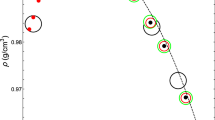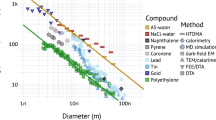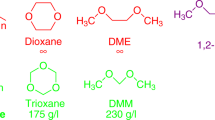Abstract
SEVERAL real atmosphere and laboratory spectroscopic measurements1–3 suggest that water vapour near saturation contains polymeric molecules of which the concentration rises with increasing pressure and decreasing temperature. Existing PVT data which could support this conclusion lack the necessary accuracy for temperatures which are approaching atmospheric values and no related speed of sound measurements seem to be available for the conditions of interest.
This is a preview of subscription content, access via your institution
Access options
Subscribe to this journal
Receive 51 print issues and online access
$199.00 per year
only $3.90 per issue
Buy this article
- Purchase on Springer Link
- Instant access to full article PDF
Prices may be subject to local taxes which are calculated during checkout
Similar content being viewed by others
References
Gebbie, H. A., Bohlander, R. A., and Pardoe, G. W. D., Nature, 230, 522 (1971).
Bohlander, R. A., Gebbie, H. A., and Pardoe, G. W. F., Nature, 228, 157 (1970).
Gebbie, H. A., Bohlander, R. A., Emery, R., and Gimmestad, G. G., Nature (in the press).
Author information
Authors and Affiliations
Rights and permissions
About this article
Cite this article
ASHWELL, G., EGGETT, P., EMERY, R. et al. Molecular Complexity of Water Vapour and the Speed of Sound. Nature 247, 196–197 (1974). https://doi.org/10.1038/247196a0
Received:
Issue Date:
DOI: https://doi.org/10.1038/247196a0
This article is cited by
-
A computational study of the ozone dimer
Journal of Atmospheric Chemistry (1993)
-
A refined evaluation of the gas-phase water-dimerization equilibrium constant within non-rigid BJH- and MCY-type potentials
International Journal of Thermophysics (1992)
-
A theoretical evaluation of water oligomer populations in the Earth's atmosphere
Journal of Atmospheric Chemistry (1988)
-
Decomposition of atmospheric water content into cluster contributions based on theoretical association equilibrium constants
International Journal of Thermophysics (1987)
-
Light-scattering experiments on water Vapour at pressures approaching saturation
Nature (1976)
Comments
By submitting a comment you agree to abide by our Terms and Community Guidelines. If you find something abusive or that does not comply with our terms or guidelines please flag it as inappropriate.



